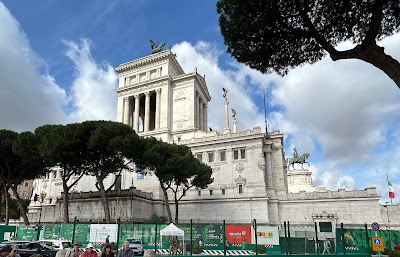Rome is my favorite city. It is filled with monuments, statues, fountains, gardens, parks, squares and rife with a history that precedes the gladiators in the Colosseum, the poets near the Spanish Steps, and the Vatican. There is so much to see as a visitor you sometimes miss the little details, the ornate and symbolic flourishes, that decorate the scenery.
I am determined to bring Theo to see one of Rome's most famous monuments, nicknamed the Vittoriano, the symbolic center of Rome. It was built to honor Italy's first King--Victor Emmanuel II--who reigned after Italy was unified into a country. Unfortunately, his grandson, Victor Emmanuel III, who ruled Italy from 1900 until 1946 has a checkered reputation--responsible for bringing democratic reforms to Italy, but then later also responsible for empowering Mussolini to enter WWII.
Nevertheless, the monument honors Italy's first King and does so much more. As a modern forum or public square, it contains stairways, columns, fountains, statues and views. It is seen as a kind of secular temple consecrated to Italy. It sits atop Capitoline Hill, near the ancient Roman Forum and Colosseum, and it is where most of the most important national celebrations in Italy today are held.
"You must see the Vittoriano," everyone says. "The wedding cake." Because it looks like one.
I look at Theo. "We have to see the Vittoriano."
The gangster cat doesn't miss any chance to negotiate. "What's in it for me?"
"Snacks."
Theo clearly doesn't want to go. But the idea of snacks is a powerful draw. "For a little while," he concedes.
We arrive on foot after a delicious lunch. Dan is holding Theo because we've been walking so many steps, we're afraid the kid (with the short legs) will pass out.
He's remarkably well behaved at first. He seems to be genuinely interested in what we're looking at. Of course, we're plying him with croccantini (dry cat food), Temptations (which we keep in small ziplock baggies) and Churos whenever we stop to admire something.
Dan puts him down. The monument isn't crowded. Most visitors seem to be Italians who are milling about on their lunch hour. They gingerly step over or step to the side when they see Theo. No one bats an eye.
This monument is a big place, and I have to admit, I'm overwhelmed by the grandeur of it all. There are statues galore on top of the roof.
I'm overwhelmed when--caught against the backdrop of the bluest of skies--an angel flies into view.
At this point I don't know if Theo's looking or not, but I suspect not. Whenever I look down, he's eating a snack or licking a Churu.







































